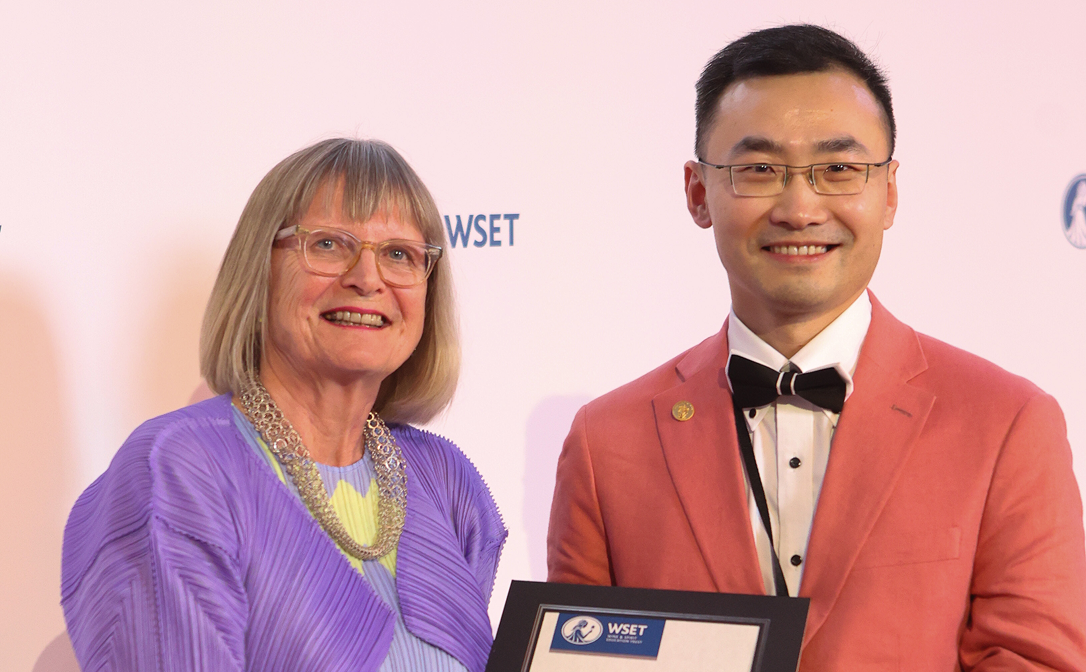Pictured above: WSET CEO Michelle Brampton, prize recipient Gus Zhu, and WSET Honorary President Dr. Laura Catena.
As we continue to mark graduation season at WSET, we're proud to celebrate the people shaping the future of the drinks world... our alumni. At our recent graduation ceremony, Gus Zhu was awarded the Outstanding Alumni Award, sponsored by JancisRobinson.com, in recognition of his remarkable contributions to the global drinks community.
Read on to explore Gus’s journey through wine and education, the roles he’s held across the industry, and his advice for current and future WSET Diploma in Wines students.
His book, Behind the Glass: The Chemical and Sensorial Terroir of Wine Tasting, is out now.
Your journey into wine began through education, studying under Fongyee Walker MW and Edward Ragg MW. What inspired you to pursue wine seriously, and how did your early experiences shape your path?
When I started learning and teaching about wine at Dragon Phoenix Wine Consulting (the wine education and consulting company co-founded by Fongyee Walker MW and Edward Ragg MW in China), I naturally became attracted to the deliciousness of various wine styles, as well as the enthusiasm of wine lovers in China. My undergraduate major was Horticulture, so my background in agriculture, chemistry, and biology helped me connect the dots in wine knowledge, at least in terms of viticulture and winemaking.
How did completing the Diploma contribute to your understanding of wine, and in what ways did it prepare you for both scientific research and the Master of Wine programme?
The WSET Diploma is truly the best introduction to every sector of the global wine industry, offering solid depth across each subject. It helped me become well-versed in understanding the similarities and differences of wine regions around the world, which provided an excellent foundation for the Master of Wine programme. In terms of scientific research, completing the WSET Diploma gave me the confidence and skills to think critically and communicate effectively about wine-related topics in English. This was particularly valuable when applying for and being accepted into the Master of Science in Viticulture and Enology program at UC Davis.
What does receiving the WSET Outstanding Alumni Award mean to you personally, especially as the first Chinese national MW?
I simply feel honoured and lucky to be recognised. I also feel very thankful to everyone who taught me and inspired me in life.

Jancis Robinson and Gus Zhu.
As a scientist at Harv 81 Group, your work focuses on research and quality control. How do you see the intersection between science and wine appreciation evolving, especially in areas like sensory analysis?
This may sound subjective, but I feel like I couldn’t ask for a better job. At the Harv 81 Group, my role involves two major areas. One is all about precision and accuracy - I analyze haloanisole compounds (mainly 2,4,6-trichloroanisole, or TCA) as part of the sampling procedures and quality control for natural corks. I feel tremendously proud to use the most sensitive analytical equipment available to detect and help eliminate these compounds at extremely low concentrations, as they can ruin people’s appreciation of wine. The other part of my work is more creative - conducting sensory studies on oak and wine interactions. I’m fascinated by how significantly oak influences the aroma and mouthfeel of wine, and how the same oak (with identical origin, toasting, and size) can produce different sensory outcomes depending on the base wine. I regularly share my findings with winemakers and taste alongside them. In summary, everything I do as a research and development scientist at Harv 81 remains closely connected to the evolving appreciation of wine.
Your book, Behind the Glass, dives into the chemical and sensorial aspects of wine tasting. What key insights would you share with Diploma students or alumni looking to deepen their tasting skills?
One key insight I emphasized in Behind the Glass is that our sensory perceptions and ways of communicating about wine can vary greatly from person to person. That’s why it’s so important to understand - and respect - your own sensory experiences. Tasting is deeply personal, and recognizing your own responses is the foundation for becoming a better taster. Another important point is that, no matter how many books or materials you read on wine tasting, the best way to improve is simply to taste as many wines as possible. For Diploma students especially, I recommend sticking to what the WSET Diploma has encouraged from the very beginning: taste widely, and consistently use the SAT to write detailed tasting notes.
You’ve worn many hats—educator, researcher, and now published author. How has your academic background influenced your approach to wine communication and writing?
Yes, I still teach wine part-time, and my academic background has definitely helped me become a better communicator. I’ve found that the deeper I understand the technical side of things, the more clearly and simply I can explain them. That was exactly my goal with the book – I tried my best to make the chemical and sensory aspects of wine tasting more approachable for readers. I’m not a professional writer, and English isn’t my native language, so I feel especially grateful when I hear feedback about the readability of the book - both the positive and the constructive comments.
If you were to give someone advice on how to tackle the Diploma exams, what three top tips would you give them?
1. Read the Level 4 Diploma specification and all the official guidance materials published by WSET.
2. For the tasting exam, follow the SAT to the letter.
3. For theory, learn the WSET factors well and always think about how those factors influence the style, quality and/or price of wine.
In case you missed it, read our interview with Develop Prize winner, James Eastmond.


